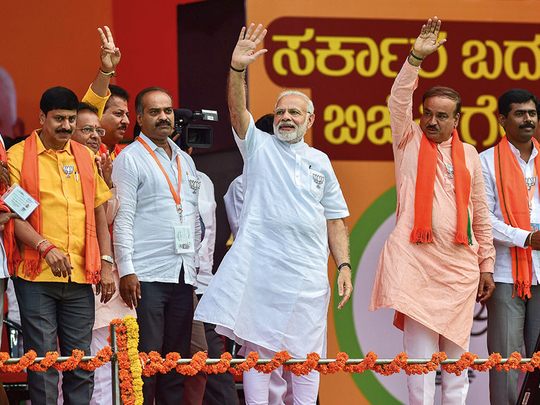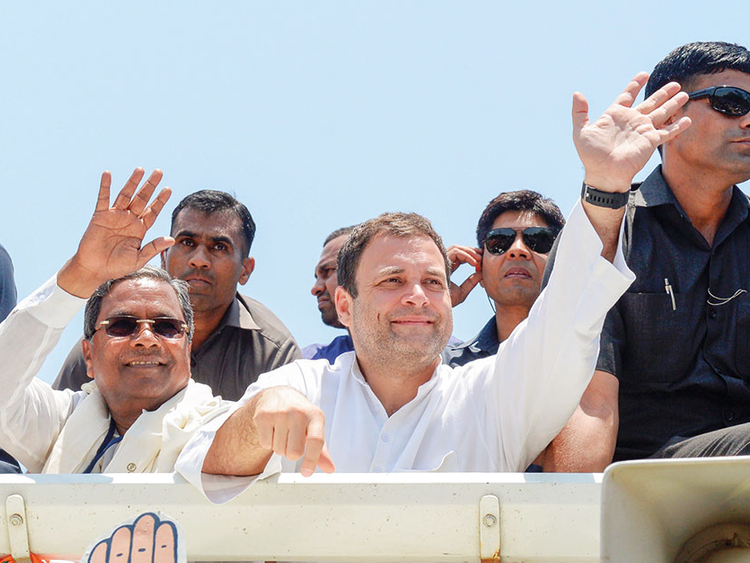
New Delhi: Both Congress and Bharatiya Janata Party (BJP) are likely to pull all their weight behind upcoming Karnataka state legislative assembly election. This is going to be a tough contest over 224 assembly constituencies.
1) What is happening in Karnataka?
The schedule of Karnataka state legislative assembly election was announced by Election Commission of India on March 27, 2018, saying that polling would be held in a single phase on May 12. It was also announced that the provisions of the Model Code of Conduct “came into force with immediate effect”.
2) Why is this election being considered national bellwether?
This is an existential battle for Congress as the party has been reduced to power in only three states — Karnataka, Punjab and Mizoram. Losing Karnataka could mean erosion of Congress president Rahul Gandhi’s credibility. The loss would disappoint the Congress party cadre in the country and adversely impact the party’s position in the 2019 general elections.
Karnataka also matters for BJP because a victory will reverse the losses the party suffered in bypolls in Madhya Pradesh, Uttar Pradesh, Bihar and Rajasthan.
3) What are the key issues and agenda?
A key election issue ahead of polls is farm distress. Farmers are unhappy that the state government did not start the Minimum Support Price (MSP) operations.
Farmer troubles remain significantly large. As many as 3,515 farmers have committed suicide between April 2013 and November 2017, and the highest within a year in a state in 2015-16. Given that agriculture employs more than 60 per cent of the workforce in the state, winning the trust of the farmers is essential to gaining a majority.
Besides, the Siddaramaiah government has declared the Lingayats to be a religious minority. Lingayats emerged as a reactionary force against Hinduism in the 12th century. They have demanded a separate religious status for themselves. The community which currently forms 17 per cent of Karnataka’s population is a major vote bank for political parties. In the past few decades, Lingayats have supported BJP. By promising to give separate religious status to the community, BJP stands to lose much in their effort to create vote bank based on Hindu solidarity. Congress may gain if that happens.
Significantly, BJP officially began its election campaign on November 2, 2017. The party spent 85 days covering all the assembly constituencies, culminating in Bengaluru on February 4, 2018, with Prime Minister Narendra Modi addressing it. In early March, the party launched a 14-day Protect Bengaluru March with an agenda to “revive and rebuild” the city from Indian National Congress’ “criminal neglect”.
In December 2017, Karnataka Pradesh Congress Committee, although not part of the election campaign, undertook a task of setting up booth-level committees at 54,261 locations in the state which was responsible to disseminate information on various programmes of ruling Indian National Congress and their implementation.
The agenda was an “extensive outreach programme” preceding the elections and improving the image of the party.
4) Who are the big names to look out for?
The prominent faces BJP has fielded in this election are BS Yeddyurappa who is the party’s chief ministerial candidate. Besides, senior leaders Jagadish Shettar and B Sriramulu are also contesting elections.
From Congress, CM Siddaramaiah will contest along with state home minister Ramalinga Reddy and one of India’s richest politicians DK Shivakumar.
Janata Dal (Secular) has nominated former CM HD Kumaraswamy and his elder brother HD Revanna to contest as their key leaders.
5) What are the key controversies?
Election Commission of India ran into a major embarrassment on March 27, 2018, when Karnataka Congress’ social media in-charge, Srivasta, tweeted the dates before they were officially released. BJP Information Technology (IT) cell head Amit Malviya also tweeted the election dates. However, both of them got the counting day incorrect in their tweets. Both the tweets were deleted after an outrage on twitter.
Om Prakash Rawat, the Chief Election Commissioner of India, formed a committee to investigate into the alleged leak. The terms of reference of the formed committee included probing certain media outlets and Congress’ social media head Srivasta, but not BJP’s Amit Malviya. This prompted allegations of the Election Commission of India being biased for BJP by Congress.
On April 14, 2018, the committee said that the media reports were mere speculation and not a leak.
6) Who said what?
Prime Minister Narendra Modi flayed Congress for misleading the country in the name of Dalit (those belonging to lower castes) community.
“Congress does not care about ‘Dil’ (people’s hearts and feelings) or Dalits. They only care about deals. If they cannot do welfare in Karnataka, then they should be bid farewell. Congress is obviously uncomfortable today because the highest offices of the land are occupied by people from poor and humble backgrounds. That is why now Congress prefers to mislead in the name of the Dalit community,” he said in a poll rally in Karnataka.
Earlier, Congress president Rahul Gandhi said Bharatiya Janata Party (BJP) wanted Dalits to exist at the bottom rung of the society.
“Central to BJP fascist ideology is that Dalits must continue to exist at the bottom rung of society. It is a dangerous mindset and it is openly propagated by senior BJP leaders in Karnataka and elsewhere. Every 12 minutes, Dalits faces atrocity, everyday six Dalit women are raped in the country. Why Dalits are constantly prosecuted in Modi’s new India. His silence reflects the mindset of BJP,” he said.
Karnataka Chief Minister (CM) Siddaramaiah refuted BJP’s claim of winning the upcoming assembly election.
“Yeddyurappa is claiming that BJP will come to power. If you look at BJP’s track records they haven’t won a seat in many crucial constituencies. Congress will come back to power in Karnataka with full majority,” he said.
7) When will be the results announced?
The results will be declared on May 15, 2018.
Key players
H.D. Deve Gowda
Gowda earned a diploma in civil engineering from LV Polytechnic, Hassan, Karnataka, in the late 1950s.
He joined Indian National Congress party in 1953 and remained a member until 1962. He later joined Janata Party and became the president of the party’s Karnataka state unit. Currently, Gowda is the national president of Janata Dal (Secular) party,
B.S. Yeddyurappa
He was the 19th chief minister of Karnataka and is currently president of Karnataka BJP. He is a member of the 16th Lok Sabha and represents Shimoga constituency. He became the chief minister of Karnataka after leading BJP to a victory in the 2008 Karnataka assembly election. He was the first person from BJP to become chief minister of a South Indian state.
Siddaramaiah
— Agencies













